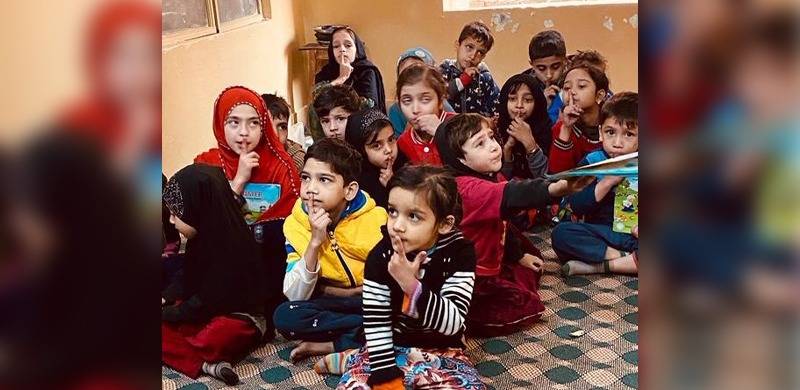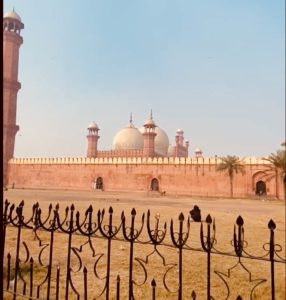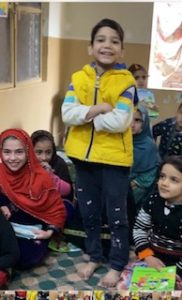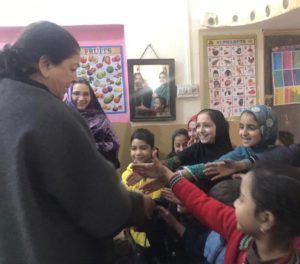
On a smoggy cold day of Lahore, we planned a visit to one-room home schools, known as the Smart Schools, established around the city by Institute of Rural Management (IRM), a not for profit organisation.
Iram, in charge of the IRM Smart School’s programme was to take me on a day long visit and arrived at my Lahore home, on the dot at 9.30 am. The plan was to visit three locations where schools have been established, all three very different from each other.
We drove 35 Miles on heavily congested Multan Road, in very poor visibility due to heavy smog, to a place where brick kilns are located, and schools established for children of brick makers.
We will discuss these later.
Iram is a very confident, dedicated and remarkable young woman. She is the administrator, manager and the entire office. She operates from her home, and from her moving car: to assist her is an equally very committed and dedicated young woman, Shazia. Both work 24/7, and are in the 'field' all day, all the time. Iram uses her personal automatic Corolla, and drives herself, and is a superb driver. She draws a salary and receives some money as car fuel from the IRM.
The IRM Smart Schools have been established to bring out of school street children from disadvantaged families, back to school and to mainstream them through provision of low-cost but quality primary education in a multi-grade classroom setting and prepare them for board exams for grade 5. In the year 2019, 82 students after completion of primary education enrolled in regular government schools.
To date 61 Smart Schools have been established and commitment for 10 more has been assured. Current enrollment stands at 2060 of out of school street children (53% Girls and 47% Boys) in Punjab, Sindh and Islamabad Capital Territory. Small funding is provided for each school by individual donors.
Here I would like to talk about the one school in Heera Mandi, the Diamond Market.
Government schools and private schools exist in the area, but IRM’s Smart School provides free quality education using modern teaching interactive techniques and is the only one of its kind.
I must admit, despite being a Lahori, there was always hesitation and reluctance on my part to even talk about the area leave alone visit. And today, I am walking its narrow streets to visit a small home school for little children of the area.
Heera Mandi is located inside the Walled City of Lahore, near the Taxali Gate, and south of the Badshahi Mosque. The market had historically been the centre of the city's refined tawaif culture since the 15th and 16th centuries.
Heera Mandi, is defined by locals, who for the beauty of girls of the market: the word Heera means 'diamond' in Urdu. Historically, the market is named after Heera Singh, the son of a minister of Ranjit Singh's court. The neighbourhood is sometimes also referred to as Shahi Mohalla, “The Royal Neighbourhood", given its close proximity to the Lahore Fort.

From Lahore canal bank to the Badshahi Mosque took us more than an hour through congested traffic ridden roads, and Iram navigated beautifully, parking her car near the Badshahi Mosque and the Food Street. She greeted the men standing around, supposedly, car watchers. All seemed to know her.
Artist Iqbal Hussain of famous and now disputed restaurant Coocoo's Den was born and lives in his mother's property across from the Badshahi Mosque close by. So is Yousaf Sallahuddin’s Barood Khana, Lahore’s cultural hub.
I did not know how far and where we were headed to - taking the lead, covering her head with a chaadar, Iram marched confidently, followed by Shazia and then me trudging behind taking photos and videos. We walked through a maze of long streets and narrow alleys.
The buildings on both sides of the roads and alleys are high rises, four to five stories high with balconies, still strong and lived in. Several generations occupy each apartment. In some cases, eighteen people live in one room with very basic amenities.
Roads, streets and alleys were built using small bricks of olden times; good sewerage system exists, with no open sewerage lines, or overflowing gutters.
It is economically depressed area, and sex trade still continues. After former military dictator Zia-ul-Haq’s crackdown, most activities moved to different locations of Lahore and with technology, online services are now used.
Birth of a girl is celebrated more than that of a boy, as the girl becomes the bread winner and the boy burdens the family. We walked by the famous Museum, the Fakir Khana.
More walking, through narrow winding alleys, past a white marble mosque, and a large red brick Madrassah with several young men loitering outside. Iram finally stopped outside a small old wood and jali entrance door. A frail looking small woman in her 60s stepped out and Iram greeted her. The woman lives with the family that provided the room for the school, and also attends class with the little students and studies the same lessons.

I tried to engage her in a conversation, she did not wish to talk and walked away. I wondered what her life story was!
Class room that is called a school is located on the second floor. A narrow concrete spiral stair case with very high steep steps had to be climbed and in total darkness that a phone torch was used and I was assisted to climb to the second floor.
Entering the clean bright large room was pure joy; we we were greeted by a chorus of happy chirpy voices: "Good morning, madam."
About 20 beautiful little children dressed in their best, very well groomed, greeted us. They were sitting on the carpet in rows with their readers in front of them. It was past 11.30 am, and the class had just begun. Day for the locals begins at 12 noon.
A donor generously provided funds and the room had basic furnishings. New wall to wall carpet, a teacher’s desk and chair, and some spare chairs, a white board and educational posters on the walls.
The room appeared to be the best in the area: airy, clean and bright and very well maintained.
The classroom space was found after great difficulty. Luckily, the owner is also the teacher, educated up to Matriculation, who along with her brother manage the school. Rupees eight thousand per month is paid as room rent, and Rupees ten thousand as teacher’s salary. So the teacher receives 18 thousand per month and works at home.
The teacher and her brother searched the area for students and after convincing mothers about the benefits and importance of education and knowledge for their little children, succeeded in bringing into the class room 22 young children. She goes to the homes of the absentees bringing them back to class. The school has been in existence for 3 months.
To my queries, students enthusiastically responded. After telling me that they are in 'Nursery class', and recited the nursery rhyme, twinkle twinkle little star; sang the entire ABC, and the Alif Bay Pay; began counting, I had to stop them at 50! They also read from the picture readers, all wished to read.
Quite an achievement in 3 months.
Iram asked them if they had cleaned their teeth, all responded, yes they did the miswak - the organic antibacterial teeth cleaning twig!
Mothers were provided guidance in hygiene and cleanliness and the children were very clean, well groomed and smartly dressed. The teacher shared with us difficulties and challenges she faced and continues to face, and with the support and assistance of her brother both continue running the school.

While the teacher was speaking, the class became noisy, one teacher told them to be quite and to “put their fingers on their lips”, and obeying, smack came out little index fingers and were on their lips — and they continued smiling.
This action took me back to my childhood, 70 years ago - and to class in Lahore Convent of Jesus and Mary, where we too were instructed by our teachers to put our fingers on our lips, and we did and stayed quite.
Delicious doodh patti chai was served to us and the students each received a packet of juice - courtesy the visitors. They behaved mature and orderly, and took their juice packets one at a time.
Departure time, all stood up and in chorus, said Khuda Hafiz. When I stepped up to shake hands, all happily crowded around me and gave me their hands, that I shook.
What an amazing experience for me and I am sure all on returning home had stories to tell of a tall great granny visiting them, listening and speaking to them, and each got a packet of juice.
Return walking journey was the same - through a maze of streets and alleys.
To my query, “How do you remember all the corners, bends and alleys”.
Iram said, “Now we remember, earlier, we took photos of streets and land marks. We stopped to take photos, a young man on a motorbike asked loudly, “Are you tick tok girls!”
“No”, Iram yelled back!
Visit to the area and school was emotionally challenging and draining.
Iram, in charge of the IRM Smart School’s programme was to take me on a day long visit and arrived at my Lahore home, on the dot at 9.30 am. The plan was to visit three locations where schools have been established, all three very different from each other.
We drove 35 Miles on heavily congested Multan Road, in very poor visibility due to heavy smog, to a place where brick kilns are located, and schools established for children of brick makers.
We will discuss these later.
Iram is a very confident, dedicated and remarkable young woman. She is the administrator, manager and the entire office. She operates from her home, and from her moving car: to assist her is an equally very committed and dedicated young woman, Shazia. Both work 24/7, and are in the 'field' all day, all the time. Iram uses her personal automatic Corolla, and drives herself, and is a superb driver. She draws a salary and receives some money as car fuel from the IRM.
The IRM Smart Schools have been established to bring out of school street children from disadvantaged families, back to school and to mainstream them through provision of low-cost but quality primary education in a multi-grade classroom setting and prepare them for board exams for grade 5. In the year 2019, 82 students after completion of primary education enrolled in regular government schools.
To date 61 Smart Schools have been established and commitment for 10 more has been assured. Current enrollment stands at 2060 of out of school street children (53% Girls and 47% Boys) in Punjab, Sindh and Islamabad Capital Territory. Small funding is provided for each school by individual donors.
Here I would like to talk about the one school in Heera Mandi, the Diamond Market.
Government schools and private schools exist in the area, but IRM’s Smart School provides free quality education using modern teaching interactive techniques and is the only one of its kind.
I must admit, despite being a Lahori, there was always hesitation and reluctance on my part to even talk about the area leave alone visit. And today, I am walking its narrow streets to visit a small home school for little children of the area.
Heera Mandi is located inside the Walled City of Lahore, near the Taxali Gate, and south of the Badshahi Mosque. The market had historically been the centre of the city's refined tawaif culture since the 15th and 16th centuries.
Heera Mandi, is defined by locals, who for the beauty of girls of the market: the word Heera means 'diamond' in Urdu. Historically, the market is named after Heera Singh, the son of a minister of Ranjit Singh's court. The neighbourhood is sometimes also referred to as Shahi Mohalla, “The Royal Neighbourhood", given its close proximity to the Lahore Fort.

From Lahore canal bank to the Badshahi Mosque took us more than an hour through congested traffic ridden roads, and Iram navigated beautifully, parking her car near the Badshahi Mosque and the Food Street. She greeted the men standing around, supposedly, car watchers. All seemed to know her.
Artist Iqbal Hussain of famous and now disputed restaurant Coocoo's Den was born and lives in his mother's property across from the Badshahi Mosque close by. So is Yousaf Sallahuddin’s Barood Khana, Lahore’s cultural hub.
I did not know how far and where we were headed to - taking the lead, covering her head with a chaadar, Iram marched confidently, followed by Shazia and then me trudging behind taking photos and videos. We walked through a maze of long streets and narrow alleys.
The buildings on both sides of the roads and alleys are high rises, four to five stories high with balconies, still strong and lived in. Several generations occupy each apartment. In some cases, eighteen people live in one room with very basic amenities.
Roads, streets and alleys were built using small bricks of olden times; good sewerage system exists, with no open sewerage lines, or overflowing gutters.
It is economically depressed area, and sex trade still continues. After former military dictator Zia-ul-Haq’s crackdown, most activities moved to different locations of Lahore and with technology, online services are now used.
Birth of a girl is celebrated more than that of a boy, as the girl becomes the bread winner and the boy burdens the family. We walked by the famous Museum, the Fakir Khana.
More walking, through narrow winding alleys, past a white marble mosque, and a large red brick Madrassah with several young men loitering outside. Iram finally stopped outside a small old wood and jali entrance door. A frail looking small woman in her 60s stepped out and Iram greeted her. The woman lives with the family that provided the room for the school, and also attends class with the little students and studies the same lessons.

I tried to engage her in a conversation, she did not wish to talk and walked away. I wondered what her life story was!
Class room that is called a school is located on the second floor. A narrow concrete spiral stair case with very high steep steps had to be climbed and in total darkness that a phone torch was used and I was assisted to climb to the second floor.
Entering the clean bright large room was pure joy; we we were greeted by a chorus of happy chirpy voices: "Good morning, madam."
About 20 beautiful little children dressed in their best, very well groomed, greeted us. They were sitting on the carpet in rows with their readers in front of them. It was past 11.30 am, and the class had just begun. Day for the locals begins at 12 noon.
A donor generously provided funds and the room had basic furnishings. New wall to wall carpet, a teacher’s desk and chair, and some spare chairs, a white board and educational posters on the walls.
The room appeared to be the best in the area: airy, clean and bright and very well maintained.
The classroom space was found after great difficulty. Luckily, the owner is also the teacher, educated up to Matriculation, who along with her brother manage the school. Rupees eight thousand per month is paid as room rent, and Rupees ten thousand as teacher’s salary. So the teacher receives 18 thousand per month and works at home.
The teacher and her brother searched the area for students and after convincing mothers about the benefits and importance of education and knowledge for their little children, succeeded in bringing into the class room 22 young children. She goes to the homes of the absentees bringing them back to class. The school has been in existence for 3 months.
To my queries, students enthusiastically responded. After telling me that they are in 'Nursery class', and recited the nursery rhyme, twinkle twinkle little star; sang the entire ABC, and the Alif Bay Pay; began counting, I had to stop them at 50! They also read from the picture readers, all wished to read.
Quite an achievement in 3 months.
Iram asked them if they had cleaned their teeth, all responded, yes they did the miswak - the organic antibacterial teeth cleaning twig!
Mothers were provided guidance in hygiene and cleanliness and the children were very clean, well groomed and smartly dressed. The teacher shared with us difficulties and challenges she faced and continues to face, and with the support and assistance of her brother both continue running the school.

While the teacher was speaking, the class became noisy, one teacher told them to be quite and to “put their fingers on their lips”, and obeying, smack came out little index fingers and were on their lips — and they continued smiling.
This action took me back to my childhood, 70 years ago - and to class in Lahore Convent of Jesus and Mary, where we too were instructed by our teachers to put our fingers on our lips, and we did and stayed quite.
Delicious doodh patti chai was served to us and the students each received a packet of juice - courtesy the visitors. They behaved mature and orderly, and took their juice packets one at a time.
Departure time, all stood up and in chorus, said Khuda Hafiz. When I stepped up to shake hands, all happily crowded around me and gave me their hands, that I shook.
What an amazing experience for me and I am sure all on returning home had stories to tell of a tall great granny visiting them, listening and speaking to them, and each got a packet of juice.
Return walking journey was the same - through a maze of streets and alleys.
To my query, “How do you remember all the corners, bends and alleys”.
Iram said, “Now we remember, earlier, we took photos of streets and land marks. We stopped to take photos, a young man on a motorbike asked loudly, “Are you tick tok girls!”
“No”, Iram yelled back!
Visit to the area and school was emotionally challenging and draining.
